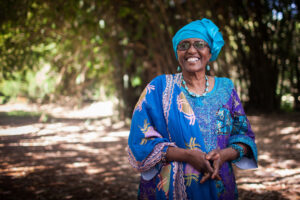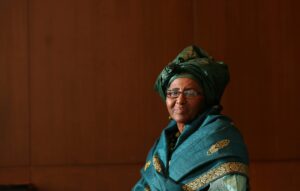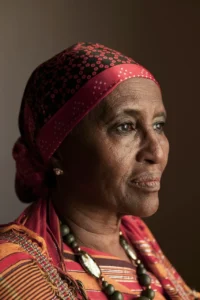Hawa Abdi (1947-2020)
Credentials
Humanitarian Cause
Healthcare and Food Security, Emergency Response, Education, Access to Healthcare, Provision of Medical Services, Water, Sanitation, and Hygiene, Access to Formal Education, Forced Displacement, Supporting Refugees, Shelter, Emergency Response, Supporting communities in climate-vulnerable regions
Impact Location
Somalia
Occupation
Medical professional / Founder, Dr. Hawa Abdi Foundation; Human Rights Activist and Physician
Photo Gallery
About
Dr. Hawa Abdi was a remarkable human rights activist and physician, known for her relentless dedication to providing healthcare, education, and shelter to displaced families in Somalia. As the founder and chairperson of the Dr. Hawa Abdi Foundation (DHAF), she created a sanctuary of hope in one of the most tumultuous regions of the world. Dr. Abdi’s legacy is firmly rooted in her belief in the power of compassion and the importance of empowering her fellow Somalis, particularly women and children, during the ongoing civil war that ravaged her homeland. Her contributions as a medical pioneer and humanitarian earned her international recognition.
Born in 1947 in Mogadishu, Somalia, Dr. Hawa Abdi was no stranger to hardship. Her father worked at the city’s port, while her mother tragically passed away during childbirth, leaving Hawa to shoulder the responsibility of raising her four younger sisters at a young age. Despite all the struggles, Hawa was determined to pursue her dreams, demonstrating an early resilience that would shape her future. With the help of a Soviet scholarship, she left Somalia to study medicine in Kyiv, Ukraine, where she earned her medical degree in 1971, becoming Somalia’s first female gynecologist upon her return. This achievement marked the beginning of her lifelong dedication to improving the lives of women and children in her homeland.
“In Africa, we carry our children on our backs and our families in our hands. Life here is filled with many obstacles. Western women have far more opportunities than us in terms of education, life, and economic empowerment.”
Dr. Abdi was eager to contribute to her country’s healthcare system, which was in dire need of development. Her work extended beyond the realm of medicine; she pursued a law degree at the Somali National University in Mogadishu, further equipping herself with the skills necessary to address both the legal and medical challenges facing her compatriots. Dr. Abdi served as an Assistant Professor of Medicine at the university, but it was her work on her family’s ancestral land in the Afgooye Corridor, south of Mogadishu, that would cement her legacy.
In 1983, Dr. Abdi established a clinic on her family’s land, using the profits from the estate to provide free healthcare to the local population. What began as a modest clinic would soon evolve into something much larger. When Somalia descended into civil war in 1991, Dr. Abdi began housing her employees and their families on her land, offering them food, shelter, and medical care amidst the chaos. As the conflict spread, more and more people flocked to the clinic seeking refuge. She welcomed them all, regardless of their background or affiliation. Her land eventually became known as the Dr. Hawa Abdi Hope Village, a sanctuary for tens of thousands of displaced Somalis.
Hope Village was more than just a temporary refuge—it was a thriving community. Under Dr. Abdi’s leadership, the village grew to house over 90,000 people, most of whom were women and children. It featured a 400-bed hospital, primary and secondary schools, and a vocational training center. Dr. Abdi’s philosophy was simple yet profound: provide people with the resources they need to survive and thrive, and they will be able to rebuild their lives. Her unwavering belief in the resilience of her people was evident in every aspect of Hope Village, where education and empowerment were as important as medical care and shelter.
“For the last 20 years, I have given my heart and soul to my people. During my time on the front line, I realized that women are the leaders of their societies. They are not weak or helpless. They are very strong human beings. I believe women have the power to change the world for the better.”
Over the course of Dr. Hawa Abdi’s life, she received numerous accolades and awards, including the Roosevelt Four Freedoms Award, the John Jay Justice Award, and the Vital Voices Women of the Year Award. In 2012, she was nominated for the Nobel Peace Prize, a testament to the global impact of her work. She also received honorary doctorates from prestigious institutions like Harvard University and the University of Pennsylvania. Her efforts earned her the admiration of global figures, including former U.S. Secretary of State Hillary Clinton, who described Dr. Abdi as “a perfect example of the kind of woman who inspires me.”
Dr. Abdi’s courage and commitment to peace were evident in her tireless efforts to mediate conflicts and ensure that her village remained a sanctuary in the midst of war. She risked her life numerous times to protect her people, facing threats from militias and extremists who sought to undermine her work. Despite living through the horrors of conflict, she remained steadfast in her belief that peace was possible even in the most desperate circumstances.
Dr. Hawa Abdi passed away in August 2020, leaving behind a legacy that continues to inspire people around the world. Her daughters, Dr. Deqo Mohamed and Dr. Amina Dhiblawe, have taken up the mantle, continuing to lead the Dr. Hawa Abdi Foundation and carrying forward their mother’s vision of a peaceful and empowered Somalia. Through their work, they are ensuring that the light Dr. Abdi lit in the Afgooye Corridor will continue to shine for generations to come.




